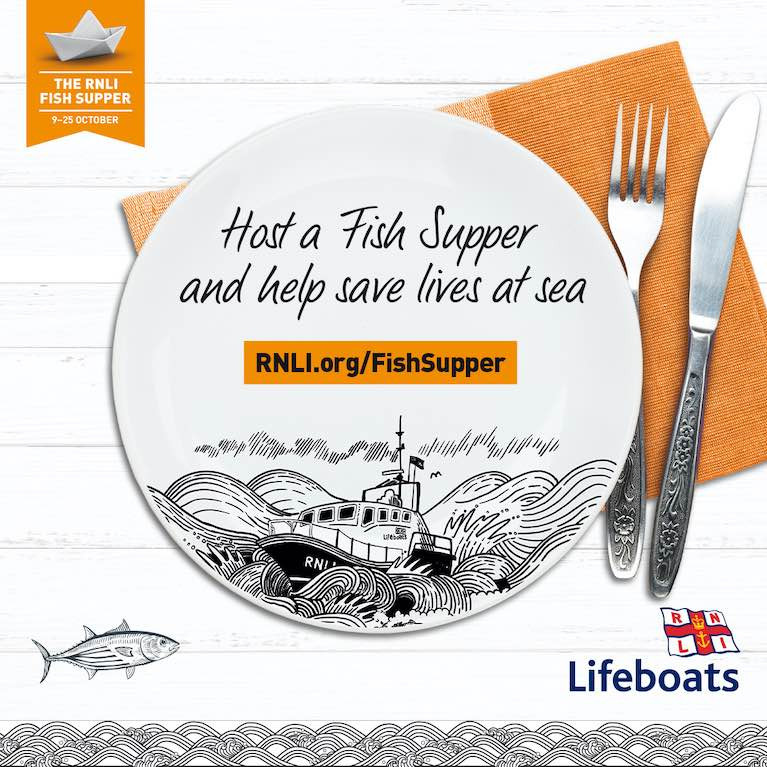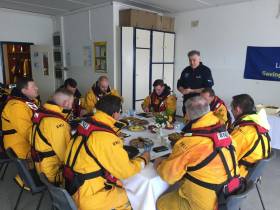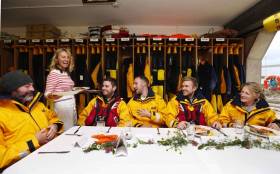Displaying items by tag: Fish Supper
Derry Clarke Does Scallops for the RNLI: Host a Fish Supper & Help the RNLI Save Lives This Autumn
Lifesavers at the RNLI are encouraging people to support them by signing up to host a Fish Supper this October or donate the price of fish and chips to raise vital funds for the lifesaving charity.
The RNLI's annual fishy fundraiser encourages people to host a Fish Supper during the month of October with donations being made in support of the lifesaving charity or if they prefer, to donate the price of a fish and chip supper.
With restrictions in place due to the Coronavirus pandemic, this year's Fish Supper event is a bit different. Therefore, the RNLI is encouraging people to host their Fish Supper online this year, if they can't have it with their household. Of course, if people prefer, they can always donate the price of a fish and chip supper online.
With the Coronavirus pandemic having a huge impact on the RNLI's ability to generate income, fundraising events like Fish Supper are more important than ever.
To give people some ideas, award-winning chef Derry Clarke, of L'Ecrivain restaurant has generously shared some of his favourite fish recipes and even accompanied them with a specially recorded video. Derry and Sallyanne Clarke are huge supporters of the work of the RNLI and Derry even wore his lifeboats t-shirt in the video.
Scallops
Mussels
The charity's lifeboat crews have faced an incredibly busy summer as people flocked to the coast and inland waters when restrictions eased. To sign up to host your own Fish Supper, and to find a load of fantastic recipes from some top celebrity chefs, visit: RNLI.org/Fish
#RNLI - Derry Clarke, owner and chef at the renowned L’Ecrivain restaurant, turned Valentia Lifeboat Station in Kerry into one of the country’s top dining sports on Friday (29 September) as he treated the volunteer lifeboat crew to a delicious Fish Supper to promote the RNLI’s latest fundraising initiative.
Clarke, who is also star of RTE’s Lords and Ladles, is supporting the RNLI’s Fish Supper campaign for 2017 from 13-15 October — and is calling on people across Ireland to sink their teeth into a delicious fish dish to raise vital funds for the lifesaving charity.
The menu for the lifeboat crew comprised a number of mouth-watering seafood dishes including cured salmon with cucumber, apple and dill; seafood chowder; Flaggy Shore oysters and Lambay Island scallops with cauliflower and raisins.
Local hotel and restaurant The Royal also got involved when chef Ryan Walsh added a surprise extra course of fish gratin.
Speaking while cooking al fresco at the lifeboat station, Clarke said: “It is an absolute pleasure to cook for the Valentia lifeboat crew. I love cooking for the RNLI, and seafood dishes are always a crowd pleaser.
“I do an annual BBQ for the RNLI with my wife Sallyanne on Sherkin Island and at Courtown in Wexford, so it’s about time I got out to the West Coast. The only issue is that you never know if you have enough food as lifeboat crew are always hungry.”
Clarke also urged anyone who hasn’t tried cooking with fish to give it a try and impress your friends and family while raising vital funds for the RNLI’s brave lifeboat crews.
“We are lucky enough to live on an island with a beautiful array of fish on our doorstep. It’s a wonderful idea for a fundraiser.”
The occasion was captured by photographer Jack Lowe, who is travelling around the UK and Ireland photographing RNLI lifeboat volunteers through a Victorian process that captures the stunning images on glass. Jack’s visit to Valentia RNLI marked his 100th lifeboat station.
Valentia RNLI coxswain Richard Quigley added: “Our pagers can go off at any time and many a meal has been interrupted for a lifeboat launch. Holding a fish supper is a great way for people to support us. They can sign up for a free fundraising pack and then enjoy hosting a fun evening with friends and family.
“If like us, you’re not Derry Clarke in the kitchen, then you can always serve up something simple like a fish finger sandwich or fish and chips. We really don’t mind.”
To receive a free Fish Supper fundraising pack, and to see some mouth-watering recipe inspiration, visit RNLI.org/FishSupper.
RNLI lifeboat crews across Ireland launched 1,136 times in 2016, rescuing 1,649 people. Kerry lifeboat stations launched 38 times and rescued 47 people in that same period, spending a total of 393 hours at sea on service.
Last year, chef Clodagh McKenna visited Howth RNLI to support the charity, which relies on donations from the public to continue its lifesaving service.
Chef Clodagh McKenna Serves Fish Supper Treat For Howth Lifeboat Crew
#RNLI - Celebrated chef, food writer and television personality Clodagh McKenna recently visited Howth Lifeboat Station, where she treated the volunteer crew to a delicious seafood supper.
McKenna’s visit marks the countdown to the RNLI’s upcoming foodie fundraiser Fish Supper, for which the charity is encouraging people across Ireland to host a fish-themed dinner between 14–16 October to raise funds to help save lives at sea.
The Clodagh’s Irish Kitchen author served a three-course meal for the lifeboat crew, starting with fresh Dingle crab cakes with Irish heirloom tomatoes and fennel aioli.
The main dish was pan-fried sea bass with hazelnut butter with dill potato dumplings and autumn vegetable salad. For dessert, the crew were treated to McKenna’s signature chocolate Guinness cake.
“It was an absolute pleasure to cook for the Howth volunteer lifeboat crew,” said McKenna. “My grandpop and uncle were both fishermen, so the work of the RNLI is very close to my heart.
“When I was filming my series Fresh From the Sea for RTÉ, I was lucky enough to get to see the work of the RNLI first hand. Please sign up to make a Fish Supper and help the courageous crews save more lives at sea.”
Last year, RNLI volunteer crew members across Ireland and the UK missed nearly 7,000 evening meals with their loved ones to brave cold, angry and often dangerous waters to save lives.
Fish Supper aims to highlight the disrupted dinners RNLI crew experience day-in-day-out, and the commitment shown not only by them but their families, who often have an empty place at the dinner table.
RNLI volunteers give up their time, comfort and often home cooked meals to respond immediately when the pagers go off.
“Our lifeboat crew here in Howth and indeed across Ireland are prepared to drop everything and respond to a call out at a moment’s notice,” said Howth RNLI mechanic Ian Sheridan.
“Our lifesaving work is essential and often challenging and dangerous. As volunteers, we are extremely grateful to people who donate so generously and host fundraising events such as Fish Supper to enable us to do what we do.”
To request your free fundraising pack and receive more information, visit RNLI.org/FishSupper where you’ll also find recipes, party game ideas and place name cards to help the evening go well.
Last year, RNLI lifeboat crews across 45 stations in Ireland had 1,098 lifeboat launches, bringing 1,244 people to safety. Of all recorded launches, 416 were carried out in the hours of darkness.
































































